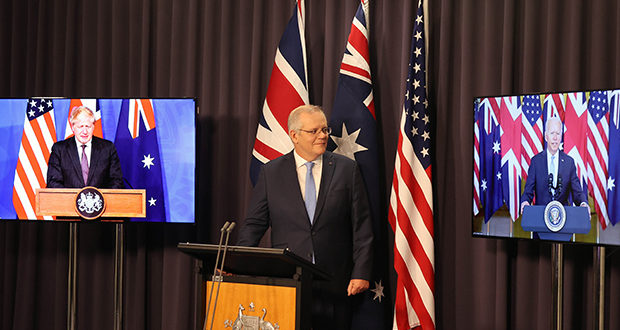The Australian National University has taken on the task of training the country’s “next generation of nuclear scientists and practitioners”, following the scrapping of the $90 billion French submarines deal and the establishment of the AUKUS alliance between the US, Australia and the UK.
One of the university’s priorities is to bolster the strength of the current nuclear workforce.
“For more than 70 years, ANU has trained the nation and the world’s nuclear scientists and experts and is the only university in Australia providing comprehensive training in nuclear physics from the undergraduate to postdoctoral level,” the university said.
“ANU also runs the country’s highest energy heavy ion accelerator – the only facility in Australia dedicated to nuclear physics research which enables hands-on training.”
Head of the ANU Department of Nuclear Physics, Professor Andrew Stuchbery, said the historic deal opened up exciting opportunities for nuclear science in the country, “which until now had limited workforce needs in the field”.
“This deal changes everything when it comes to nuclear science in Australia,” Stuchbery said. “It ushers in a new era for the nation.
“In the past, Australia’s nuclear technology workforce needs have been minimal and a lot of talented and trained people from across nuclear science have headed overseas.
“So it is absolutely vital we build sovereign capability in nuclear science. That’s exactly what we do every day at ANU.”
The nuclear physics scientist said ANU’s undergraduate and postgraduate programs in this field cover the gamut of nuclear science, such as reactor science, nuclear fuel cycles, and ensuring “policy debates on nuclear issues are informed by science and best practice”.
“For decades we’ve been training the nuclear experts Australia needs to safely deploy nuclear energy and technologies, including intensive courses with the Department of Defence,” Stuchbery said.
“We look forward to training the future generations of practitioners Australia will now need and who will help build, deploy and manage these new technologies as a consequence of this historic security deal.”
Professor Mahananda Dasgupta, director of the ANU Heavy Ion Accelerator Facility (HIAF), said the facility is the only one in the country dedicated to “fundamental nuclear research” and also has the support of the National Collaborative Research Infrastructure Fund.
“With Australia now taking on nuclear-powered subs, it is vital that the workforce understands the underpinning science and gets hands-on training in handling sophisticated instruments. That’s what the HIAF enables,” Dasgupta said.
“It drives new knowledge on fundamental nuclear processes, including nuclear reactions, nuclear structure, and highly sensitive detection methods to enable environmental monitoring at world-best levels.
“We also provide a lab environment for training personnel from Defence, ANSTO, ASIO, ONA, DFAT and Customs to learn and develop a hands-on understanding of nuclear science."
Professor Tim Senden, director of the ANU Research School of Physics, said ANU was equipped and prepared to spearhead Australia’s development in this area and “serve the nation”. “It is no different when it comes to the vital field of nuclear science,” he said.
“Australia will need talented, well-trained and knowledgeable experts in nuclear science. At ANU we have the capability, the will and the desire to deliver the experts our nation needs.
“There is no better place than ANU when it comes to harnessing the latest nuclear science research and teaching.”
Senden also invited anyone with a passion for working in this area to join the university’s activities.
International reactions to the AUKAS alliance
While Prime Minister Scott Morrison believes the higher-tech nuclear-powered submarines are essential in maintaining stability in the Indo-Pacific with rising Chinese influence, French leaders are livid with the dumping of the deal.
French Foreign minister Jean-Yves Le Dria, who was instrumental in brokering the original deal in 2016, told French radio: “This brutal, unilateral and unpredictable decision reminds me a lot of what Mr Trump used to do. I am angry and bitter.
“It’s really a stab in the back. We built a relationship of trust with Australia, and this trust was betrayed. This is not the end of the story."
It is widely understood that the French government will demand compensation for the broken deal. However, it’s also worth noting that Australia’s deal with a French shipbuilder to replace our current Collins Class with 12 new French submarines that run on conventional diesel-electric has been plagued by delays and blowouts over the last 10 years.
Meanwhile, Chinese Foreign Ministry spokesman Zhao Lijian also expressed his disappointment with the new deal, stating that it "gravely undermines regional peace and stability," and "aggravates" the arms race.
Zhao also warned Australia that the latest deal would "only end up hurting their own interests" if they continued to engage in a "cold war mentality".
On Sunday, following France's recalling of its ambassadors to Australia and the US, the new Prime Minister of Malaysia, Ismail Sabri Yaakob, released a statement raising concerns the new deal could heighten military tensions in the Indo-Pacific region.
"[The deal] will provoke other powers to take more aggressive action in this region, especially in the South China Sea," he said.
John Blaxland, professor at the Strategic and Defence Studies Centre at ANU, wrote in The Conversation that the decision will "more tightly enmesh Australia into the US orbit".
"Technologically and militarily, it means if the US goes into a conflict in the Indo-Pacific region, it would be much more difficult for Australia not to be directly and almost automatically involved," he said.
"The other side of argument is this is a good thing because it will at least incrementally add to the deterrence against China.
"Chinese strategists and leaders will have to weigh up the risk and presumably be less likely to decide that crossing the threshold of war is something they are prepared to do. The hope is that added deterrence will make the stakes higher for the Chinese and the prospects of success lower."
Domestic anxieties
While Australia currently does not have much nuclear capability, AUKUS partners the US and the UK will collaborate with Australia during the next 18 months to decide how the plan will be realised, as well as how the nuclear-propelled submarines will be refuelled.
And while defence department secretary Greg Moriarty said that “the management of waste, the disposal of the submarine at the end of its life, all of those are issues where we will be engaging with our US and UK partners,” other politicians aren’t convinced.
Greens leader Adam Bandt, for example, has called the nuclear submarines "floating Chernobyls", adding his party would vigorously oppose the new agreement.
Concerns have also been raised by Naval Group employees, who are based in South Australia and had been working on the new French submarines. A Naval Group worker told the ABC they knew little about what their futures would hold.
"It's very fresh so we don't know," he said.
"I'm not really sure how to react at the moment.
"We were not expecting this."
However, while finance minister Simon Birmingham said there was a "firm commitment" to helping them transition into new roles, he could not guarantee that all of Naval Group's employees would retain their jobs.
This story was updated at 8.51am on 20 September 2021.
Do you have an idea for a story?Email [email protected]
 Campus Review The latest in higher education news
Campus Review The latest in higher education news

